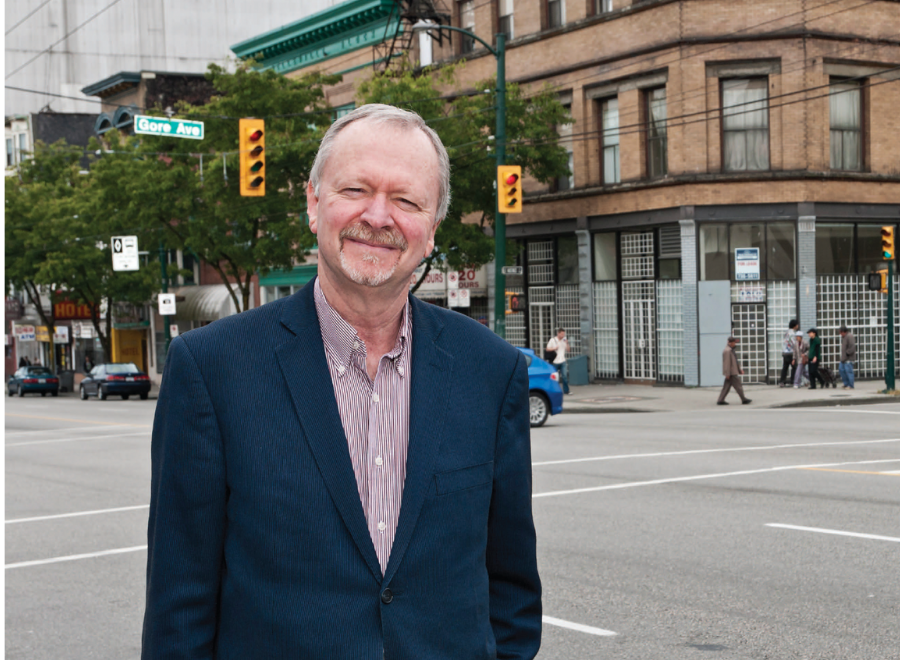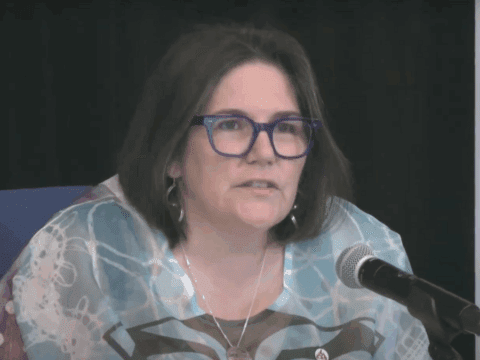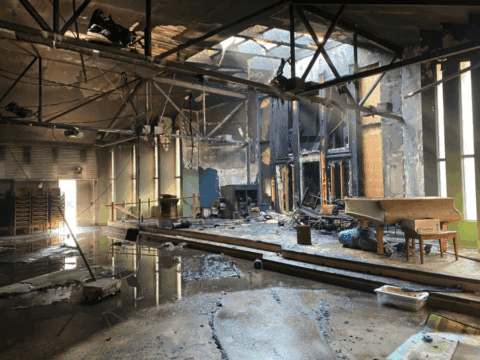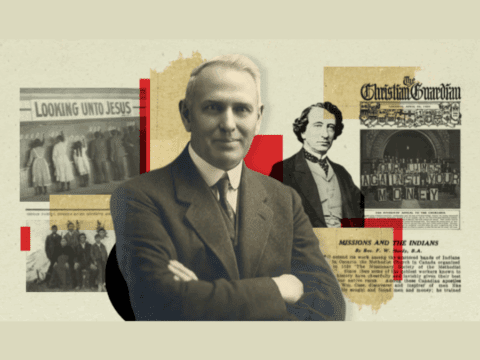In a quiet second-floor room just a stone’s throw from Hastings Street, Rev. Don Collett sinks into a leather armchair and takes a moment between counselling appointments to check his messages. Insulated from the din of Vancouver’s Downtown Eastside by cinder-block walls painted a soothing shade of green, Collett’s “office” is sparsely furnished and completely devoid of objects save for a half-dozen chairs and a flip chart emblazoned with the words “SURGERY — LIVABLE — DOWNSIZE — CLUTTER.”
Dressed in a blazer and button-down shirt, with short grey hair and a trimmed goatee, he explains that the words refer to a client he recently treated for compulsive hoarding disorder.
“She had been diagnosed with cancer, and she cancelled her surgery because she simply couldn’t make the decision to go have the operation,” Collett says. “With hoarders, it’s not only the external stuff like making the decision to throw things out; it’s life issues as well. Rather than go through the anxiety of having to commit themselves to something, they’ll make no decision at all.”
A trained family therapist and United Church minister, Collett has spent the last three years at First United in the hardscrabble Downtown Eastside, counselling low-income clients who are obsessed with collecting and keeping objects in their homes.
Collett, 58, stumbled on his new calling when he left West Vancouver United after a decade as executive minister and took a volunteer counselling position at First United, where his wife, Rev. Sandra Severs, is the deputy executive minister.
He was eager to expand his skills as a family therapist but unsure of what to expect. One of his first clients was a 72-year-old man who admitted to suffering from compulsive hoarding disorder, a condition Collett knew nothing about.
As he began researching the topic, other hoarders sought him out and Collett soon found himself offering group therapy sessions. Surprised at the prevalence of hoarding cases, he saw an opportunity to tackle the problem head-on.
“Don has really spearheaded the whole education aspect of this issue, as far as getting us some knowledge and some tools with how to deal with it,” says First United outreach worker Keely Hale. “There’s not really anyone else working full time in this area.”
Defined as “the severe cluttering of a person’s home to the point where it no longer functions as a viable living space,” compulsive hoarding affects between two and four percent of the general population, according to a study by the San Francisco Mental Health Association. An informal survey conducted by the Carnegie Community Centre, a Vancouver social agency, estimates that hoarding affects 10 to 15 percent of residents in some parts of the Downtown Eastside.
Working on the front lines, Collett has seen his share of rooms stacked floor to ceiling with junk. Often space grows so cramped that bedrooms and bathrooms become completely inaccessible, forcing hoarders to sleep in “little nests on the floor.” In extreme cases, hoarders have been discovered living in cockroach- and rat-infested suites, ripe with rotting garbage and human feces.
Judy, a 60-year-old disability recipient who asked that her last name not be published, sought Collett’s help last fall when her landlord threatened to evict her for hoarding. After living in the building for six years, her small bachelor suite was overrun with books, magazines, clothing, office supplies, thrift-store knick-knacks and stacks of boxes that her husband left behind when he died.
“It wasn’t like I woke up and said, ‘How can I hoard today?’” she says. “When you’re living alone, you say, ‘I’ll clean up tomorrow, I’ll clean up later.’ But it never happens and you go into a tailspin.”
After three months of therapy, Judy accepted the need to change, and Collett arranged for a truck to come and clear the junk from her apartment. “He really helped me a lot,” she says. “He wasn’t judgmental or critical. I can’t say enough good things about the man.”
Easygoing with a quick sense of humour, Collett chuckles when people sometimes refer to him as “the hoarding minister,” noting that his home, a comfortable log cabin that he and Severs share with their two teenage daughters, is neither cluttered nor overly tidy. “I’m not a hoarder, but I’m not a neat freak either,” Collett says. “Sandra’s probably a little neater than me.”
The son of Rev. W. J. Collett, a United Church minister and former principal of Mount Royal College in Calgary, Collett says his passion for helping hoarders is rooted in the deep sense of Christian charity he learned from his parents, who frequently opened their home to troubled youth. “A lot of my friends and friends of my brothers and sisters came from troubled households, and they’d hang out at our place because it was a place they could be heard,” Collett says. “I suppose there are some parallels to what I’m doing now.”
After studying political science at the University of Western Ontario, Collett enrolled at Emmanuel College in Toronto in 1977. That led to a 27-year career as a minister, including stops in Mississauga, Ont., Taber, Alta., and Springbank United in Calgary, where he and Severs job-shared for six years.
But with his tenure at West Vancouver United winding down in 2008, Collett found himself at a career crossroads. “West Vancouver’s kind of a plum job. After that, there’s really nowhere to go,” he says. “I needed a fresh start.”
In hoarders, Collett saw a group of people who were under-served by the system. “Jesus’ primary concern was compassion toward marginalized people, so when I happened upon these people, I thought, this is something I can do,” he says.
When Collett arrived at First United, he planned on working for free and fundraising to help cover his costs. A couple of months later, an estate lawyer from his former West Vancouver congregation walked into his office unannounced and donated a six-figure sum on behalf of a deceased client who had earmarked parts of his estate for “worthy causes.”
“Just like that, I had enough money to sustain me for two or three years,” Collett says. “Ever since then, the thing has just fallen into my lap. I’ve got money to operate; I’ve got people coming to me. It’s like a second life.”
The mainstay of his counselling work is a 12-week group therapy course, attended by about half a dozen people whose hoarding has spun out of control. He also runs a monthly session for former group members and a drop-in night for new clients, and meets one-on-one with about a dozen individuals who aren’t ready for group work.
Compulsive hoarding is often rooted in underlying personal issues — such as an abusive upbringing, the loss of a loved one or a damaged family relationship — that need to be addressed before clients can make real progress, he says. “I find myself dealing with traumatic events in a person’s life. As they resolve those issues, they start to clean up. It’s like their head needs to clear before they can deal with the exterior stuff.”
Last year, Collett organized a hoarding symposium — the first of its kind in Vancouver — featuring two of North America’s leading hoarding experts, Randy Frost from Smith College in Massachusetts and Christiana Bratiotis from Boston University. The event brought together people who have been dealing with hoarders for years — social planners, out-reach workers, mental health professionals, fire inspectors and landlords, to name a few.
Shortly afterward, the City of Vancouver launched a compulsive hoarding project aimed at developing a co-ordinated approach to the issue and invited Collett to join a committee charged with leading the initiative.
In demand and completely immersed in his new job, Collett says his career as an executive minister seems like a distant memory, yet he still feels like a shepherd tending his flock. “In a way, I exchanged one congregation for another. It’s just that my new congregation is a bunch of people whose lives are filled with clutter,” he says. “I can’t imagine doing anything else.”
***
This story first appeared in The United Church Observer’s September 2011 issue with the title “The ‘hoarding minister.’”















